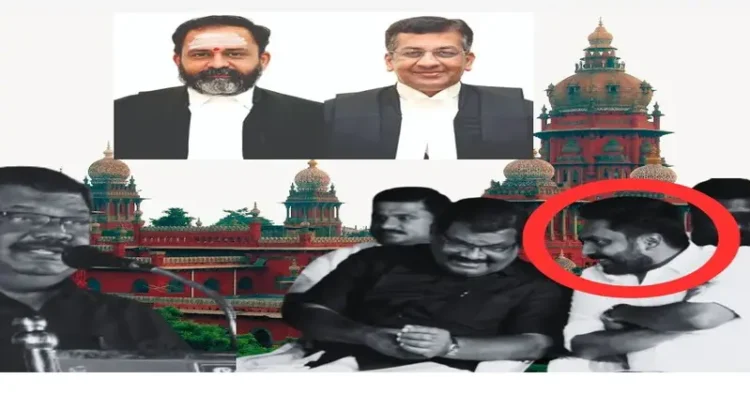In a surprising turn of events at the 145th birthday celebration of E.V. Ramasamy Naicker in Dindigul, political leader Mani took centre stage to address the audience, stirring controversy with his remarks about a judge’s attire in connection to the ongoing hijab debate.
During his speech, Mani made a pointed statement about Justice G.R. Swaminathan, who had no involvement in the hijab case proceedings. He questioned the judge’s position on the matter, drawing attention to the judge’s traditional Hindu attire, which included a forehead adorned with vibhuti (sacred ash) and Kumkum (vermillion). Mani argued that if the hijab was considered a religious symbol, then the use of vibhuti, too, should be viewed in the same light. He asked why Justice Swaminathan wore these symbols to court, suggesting that it raised questions about his neutrality on the issue. Mani’s comments have sparked outrage, with some questioning the need for legal action.
It is important to note that the hijab case in question was filed in Karnataka, and Justice GR Swaminathan’s jurisdiction does not extend to that region.
The hijab debate has been a contentious issue, especially after the Karnataka High Court upheld a ban on wearing the hijab in educational institutions, a decision that sparked outrage among some communities. In March 2022, the Tamil Nadu Thowheed Jamath (TNTJ) made headlines when one of its leaders, Covai R. Rahmatullah, issued inflammatory remarks and even implied threats against the Supreme Court judges involved in the hijab case. He suggested that if any harm were to befall the judges due to the verdict, they should be held responsible.
Mani’s comments at the birthday celebration have further fuelled the ongoing debate surrounding the hijab, raising questions about the intersection of religious symbols and the judicial system, as well as concerns about inflammatory statements in this sensitive context.
https://x.com/BS_Prasad/status/1711732076956062120?s=20
In a recent public statement, Kolathur Mani expressed strong disagreement with Judge N Seshasayee’s interpretation of Sanatan Dharma, a foundational concept in Indian philosophy. Mani’s critique centered on Seshasayee’s assertion that Sanathana Dharma primarily governs the behaviour of citizens toward their king, as well as the king’s responsibilities toward citizens, and the conduct between parents and children.
Mani, known for his candid approach, did not mince words as he challenged Judge Seshasayee’s comprehension of the subject. He questioned whether Seshasayee had thoroughly studied the related texts, stating, “Hey, fool (madaya), are you saying all this after reading the book? He did not read the law book properly; you should have at least read this book. We read it fully, to counter these dogs, we are reading all this (Sanathana Dharma-related information).”
Mani’s comments, while robustly critical, included derogatory language directed at the judges, characterizing them as fools and dogs. This debate over the interpretation of Sanathana Dharma highlights differing viewpoints within the legal and philosophical community.
Kolathur Mani’s recent comments are not his first foray into controversial territory. He previously organised an anti-Hindu rally, during which members of various Dravidianist groups launched verbal attacks on Hindu deities, including Goddess Amman, Lord Krishna, and Lord Ayyappan. Mani’s history of provocative rhetoric has led many to wonder if legal action should be taken against him.
Selective Enforcement of the Law?
In a significant development, Tamil Nadu police apprehended Badri Seshadri, a well-known publisher who leads ‘Kizhakku Pathippagam,’ during the early hours of July 29, 2023. The arrest was carried out in connection with remarks made by Seshadri during an interview on a YouTube channel concerning the Manipur issue and references to the Chief Justice of India (CJI). The arrest transpired following a formal complaint filed by advocate Kaviyarasu.
The controversial comments in question have sparked a broader discourse on freedom of speech and criticism of the judiciary. Notably, these remarks came to light during an interview in which Seshadri expressed his views on the Manipur issue, referencing the CJI.
In response to the arrest, RS Bharathi, a former Rajya Sabha member and DMK’s organising secretary, as well as a sitting Rajya Sabha MP, made a statement. He noted, “No ‘Harijan’ has become a judge of the high court in Madhya Pradesh. But in Tamil Nadu, after Kalaignar [Karunanidhi] became the chief minister, A Varadarajan became the first Dalit judge in Madras High Court. After him, around seven or eight individuals from the Adi Dravidar community have become judges in the high court. This was alms given by the Dravidian movement.”
These developments have ignited debates surrounding freedom of expression, criticism of the judiciary, and the position of the judiciary in public discourse. Journalist Sriram has pointed out, “So attacking the judiciary is in the DNA of DMK, and this is nothing new.”
The arrest of Badri Seshadri and the ensuing discussions highlight the complex interplay between free speech, legal boundaries, and the role of the judiciary in the democratic process.
Political Implications
Mani’s close connections with the ruling DMK (Dravida Munnetra Kazhagam) party leader have also raised questions about potential political influence in the handling of his case. Critics have pointed out that the DMK has a history of clashing with the judiciary, with some suggesting that attacking the judiciary may be ingrained in the party’s culture.
The controversy surrounding Kolathur Mani’s remarks has left the public and law-abiding citizens eagerly awaiting the response of the legal system. While some individuals who criticize the DMK and its leaders have faced arrests, it remains to be seen whether legal action will be taken against Mani, given his connections to the ruling party.
The controversial comments made by Kolathur Mani have sparked a heated debate, with some calling for legal action against him. The selective enforcement of the law, especially concerning individuals who target religious beliefs and political leaders, has raised concerns about political influence in the legal process. As the public awaits further developments, the case of Kolathur Mani remains a topic of significant discussion in Tamil Nadu.




















Comments